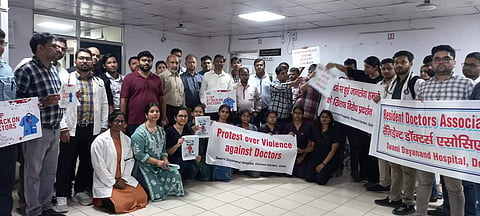

The Delhi Medical Association (DMA) launched a black badge movement today, Thursday, October 12, condemning violence against resident doctors and raising awareness about medical professional’s rights under the Delhi Medicare Service Personnel and Medicare Act, 2008.
The movement was started in light of an incident where a senior resident doctor was assaulted by a patient at the Swami Dayanand (SDN) Hospital, New Delhi, on October 8.
Following this incident, the resident doctors at SDN hospital demanded an ‘institutional FIR’ under the Delhi Medicare Service Personnel and Medicare Service Institutions (Prevention of Violence and Damage to Property) Act, 2008.
In 2019, in the view of rising cases of violence against healthcare staff, the Delhi government had made it mandatory for heads of all government hospitals to file an institutional FIR if any incident involving abuse or violence by patients or their attendants against doctors is reported.
However, the police showed reluctance to file an institutional FIR leading to a strike by the resident doctors of SDN Hospital. Their strike gained support from the Delhi Medical Association, who drafted a letter to the Deputy Commissioner of Police (DCP), Shahdara district, New Delhi, urging for necessary action.
Dr Ashwini Dalmiya, President, DMA, told EdexLive, “Most police personnel, even most healthcare professionals, are not aware of the provisions of Delhi Medicare Service Personnel and Medicare Act. We persuaded the DCP to go for an institutional FIR instead of an individual one so that the case does not turn into 'culprit vs individual doctor', but 'culprit vs the institution'. The police case might go on for years and since most of the resident doctors are from different cities and states, it becomes a hassle for them.”
Raising awareness
An institutional FIR was lodged by the Delhi Police after intervention by DMA. However, the association called for a black badge movement today, October 12, to raise awareness about the provisions of Delhi Medicare Service Personnel and Medicare Act among Delhi police as well as doctors.
“If a DCP did not know about the provisions of an institutional FIR, then no police station in Delhi will be aware of it. We have now sent letters to all police stations, DCPs and Commissioner of the police as well as all medical superintendents along with a copy of the act so they are aware of the provisions in future,” Dr Dalmiya added.
The DMA is also organising a walkathon Chalo Rajghat on October 29 to raise awareness regarding the problems faced by the Indian medical fraternity among the general public and the authorities.
The provisions of the Delhi Medicare Service Personnel and Medicare Act, 2008, will also be discussed during the walkathon, he added.
Why are resident doctors targetted?
The increasing number of cases of assault against resident doctors in the country has led to numerous concerns regarding the safety and well-being of young healthcare professionals.
While cases of violence against hospital staff and doctors are worrisome, resident doctors seem to be the most common victims in such incidents.
“There are so many cases of violence against resident doctors as they are the ones working on emergency services. Since they are directly dealing with emergency cases, they end up being the victims of patients who are frustrated,” said Dr Dalmiya.
He added that lack of awareness about one’s own rights among medical practitioners is another reason that the cases of violence against young doctors have become mainstream.
